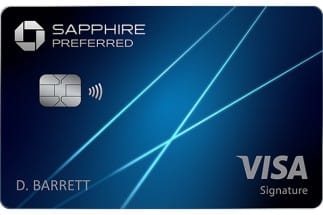For a beginner, the world of travel rewards—points, miles, transfer partners, and annual fees—can feel like a confusing maze. Yet, a travel rewards credit card is one of the most powerful financial tools you can own. When used correctly, it allows you to turn your everyday spending (groceries, dining, gas) into free flights and hotel stays.
The goal is not just to earn points, but to earn transferable points. These are the points that can be moved to major airline and hotel loyalty programs (like United, Hyatt, or Air Canada), which unlocks the highest possible value, such as business-class flights.
For a beginner, the best card is one that has a manageable annual fee (under $100), offers a high sign-up bonus, and provides excellent travel protections. Here are the top three cards that serve as the best entry point into the world of points and miles.
🏆 The Winner: Best Overall Value and Travel Protection
Chase Sapphire Preferred® Card (CSP)

The Chase Sapphire Preferred is consistently named the best all-around travel card for beginners. It provides high value and a strong rewards ecosystem (Ultimate Rewards) for a modest annual fee.
- Annual Fee: $95
- Key Earning Rates:
- 3X Points on dining, select streaming services, and online groceries.
- 2X Points on all other travel purchases.
- 5X Points on travel purchased through the Chase portal.
- The Beginner Advantage (Insurance): The CSP is famous for its incredible travel and purchase protections. This includes primary rental car insurance (meaning you don't have to use your personal car insurance if the rental is damaged), trip cancellation/interruption insurance, and baggage delay insurance. This protection easily justifies the $95 fee for any traveler.
- The Ultimate Value: Chase points transfer 1:1 to valuable partners like Hyatt (for hotels) and United Airlines (for flights). The points are also worth 25% more when redeemed directly through the Chase Travel portal (e.g., 75,000 points become $937.50 in value).
Verdict: The best blend of low fee, high earning potential on dining/travel, and world-class travel insurance. It is the ideal entry point into the world of valuable, transferable points.
The Runner-Up: Best for Simplicity and Flat-Rate Earning
Capital One Venture Rewards Credit Card

The Capital One Venture card is the best option for the traveler who hates tracking bonus categories and wants a clean, straightforward earning structure.
- Annual Fee: $95
- Key Earning Rates:
- 2X Miles on every single purchase, every day.
- 5X Miles on hotels and rental cars booked through Capital One Travel.
- The Beginner Advantage (Simplicity): You never have to think about which card to use. Whether you buy gas, groceries, or pay a medical bill, you are always earning 2X miles. This makes it perfect for consistent, automatic point accumulation.
- Key Feature: The card offers a credit of up to $100 for Global Entry or TSA PreCheck (which you only apply for once every four or five years). Crucially, the card charges $0 Foreign Transaction Fees, making it a true global travel card.
- The Ultimate Value: Capital One Miles can also be transferred to over 15+ hotel and airline partners, giving you excellent flexibility. You can also simply "erase" a travel purchase made on the card using your miles at a rate of 1 cent per mile.
Verdict: The best choice for consistent, low-stress earning across all categories.
The Zero-Fee Option: Best Rewards Without a Commitment
Wells Fargo Autograph® Card

For the true beginner who is still building credit confidence or is strictly against paying an annual fee, the Wells Fargo Autograph is the best way to earn rewards on everyday spending that can be redeemed for travel.
- Annual Fee: $0
- Key Earning Rates:
- 3X Points on a massive range of categories: dining, travel, gas, transit, and phone plans.
- 1X Point on everything else.
- The Beginner Advantage (Low Cost): This card charges no annual fee and no foreign transaction fees. You get all the travel earning benefits without the pressure of having to "offset" a fee every year.
- Key Feature: Offers up to $600 in cell phone protection against damage or theft (subject to a $25 deductible).
Verdict: The ideal starter card for earning genuine, multi-category travel rewards without any annual commitment or foreign transaction fees.
The Warning Against the Premium Card Trap
As you research, you will inevitably see premium cards with massive benefits—but be warned: these cards are almost never worth it for a beginner.
| Card Name | Annual Fee (Approx.) | Why to Avoid It Now |
| Chase Sapphire Reserve® | $550 – $795 | The fee requires heavy annual travel spending to offset its various credits and perks. |
| The Platinum Card® from American Express | $695 – $895 | The fee is offset by specific monthly credits (e.g., Uber, specific airlines, digital services). If you don't use every single credit, you will lose hundreds of dollars. |
These cards are for advanced travelers who fly every month and can flawlessly utilize every single perk. For the occasional traveler, the $95 annual fee cards like the Chase Sapphire Preferred and Capital One Venture provide far more net value and less financial pressure.
Final Verdict: Match the Card to Your Lifestyle
The best card depends on your spending habits:
- If you prioritize flexible dining rewards and travel insurance: Choose the Chase Sapphire Preferred.
- If you prioritize simplicity and hate tracking categories: Choose the Capital One Venture.
- If you want $0 fees but still earn big rewards: Choose the Wells Fargo Autograph.
Choosing one of these mid-tier, low-fee cards will put you well on your way to earning your first free flight without falling into the premium card trap. They offer a strong introductory bonus and solid ongoing rewards, setting you well on your way to earning your first free flight without the pressure, hefty costs, and complex benefits of falling into the premium card trap.






